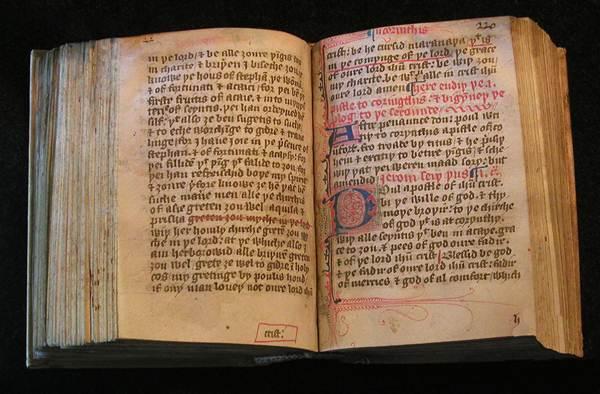As Americans affixed to Downton Abbey are learning, everything in English life is suffused with class. The staff at Downton is, by most appearances, literate. This is good news for it means they can read their Bibles (and the socialist chauffeur can read Marx). But this was not always the case. The story of the Bible’s translation into English is a fascinating one, with implications going far beyond communion.
I was reminded of this while reading Barbara Tuchman’s Bible and Sword: England and Palestine from the Bronze Age to Balfour (1956). In Chapter V, she ably sketches the translation story and wonders: “Why did this collection of Jewish family history become the book in English culture?” While Tuchman’s full answer may not satisfy some historians, her class observations are money:
But what concerned the bishops was not so much the reading of the Bible as who read it. It was not the translation [into English] as such that infuriated the bishops, but the unauthorized translation and the use of it among classes prone to heresy and revolt, who had already shown their temper in the Peasants’ Uprising of 1381.
The rich and orthodox, whose interest lay in upholding Church authority, were frequently granted special licenses to possess and read the Bible in English. But the upper classes were concerned to keep it out of the hands of the common man lest he find a direct path to God that by-passed the sacraments of the Church.
In 1408 Archbishop Arundel decreed that anyone making or using an unlicensed translation of the Bible was liable to the ultimate penalty of death at the stake; the decrees was founded on the notorious de Heretico Comburendo passed by the King and Parliament in 1400, the first statute in English law to allow the death penalty for religious beliefs.
The English came quite a long way over the next 500 years. Long before the Downton era, commoner peasants and household staff were allowed to read English Bibles without fear of execution. But the clergy, having been co-opted by the state, constantly reminded them that the important lessons to be learned had to do with acceptance and submission. Preaching passivity is a superb strategy for maintaining the status quo. It also sheds light on King James (1566-1625) famous statement: “No bishop, no king.” Here we have a match made in heaven.

John Wycliffe (1328-1384) Bible — Earliest English Translation

